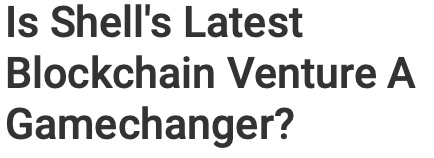


By Irina Slav – Jul 11, 2019, 3:00 PM CDT
Shell has furthered its stated commitment to cleaner electricity by investing in a U.S startup that has developed a blockchain-based platform for energy sharing.
The startup, LOW3 Energy, said in a press release earlier this week that Shell Ventures and Japanese Sumitomo had made “major investments” in its platform, which “represents a landmark moment for LO3 Energy as we begin to scale our blockchain-based energy networks around the world,” according to chief executive Lawrence Orsini.
Blockchain is already making inroads into oil trading: Earlier this year, Total and Chevron joined Shell, BP, Equinor, Mercuria, and Gunvor as shareholders of Vakt, a post-trade processing platform grounded in blockchain and aiming to eliminate the substantial fuss and paperwork around oil trades to reduce transaction times and costs. The platform’s owners claim it can drive efficiency and trade finance savings of as much as 30-40%.
Now, the technology that skeptics still believe is more hype than actual substance and usefulness is expanding into utilities. Here’s how LO3 explains how its platform works:
“Users set preferences on a dedicated mobile app, choosing how and when to use the local energy resources available to them and allowing them to select the specific sources they purchase it from. The actual electrons flow through the normal grid transmission network, but the private, permissioned blockchain manages the definition of the energy source and the contract agreement to pay for it. This enables a wide range of business use cases, including peer-to-peer energy trading, energy hedging for businesses, virtual power plants, dynamic electric vehicle charging and demand response.”
The project is being deployed with partners not just in the U.S. but also in the UK, Colombia, Japan, and Australia. From a certain perspective—the perspective of businesses who want to build a reputation for being environmentally responsible—using an app to select a renewable source of electricity makes perfect sense. From another perspective—the perspective of Shell as bad-reputation Big Oil—it makes even more sense.
Shell has been increasingly active in the electric utilities space: earlier this year the supermajor made headlines by announcing plans it wanted to become the largest power utility globally by 2030.
Related: Iran Tries To Seize British Oil Tanker
Bloomberg reported in March the Anglo-Dutch supermajor was pouring US$2 billion annually into its new energies division that aimed to expand its presence in cleaner power generation. This segment could yield returns of between 8 and 12 percent, the head of the new energies unit, Maarten Wetselaar, told Bloomberg.
In light of these plans, any further expansion into the power utility space fits in with Shell’s strategy, especially one so focused on facilitating and thus promoting the use of locally sourced renewable energy.
“We see that it’s society’s ambition to live in a lower-carbon environment,” Shell Ventures’ investment director Kirk Coburn said as quoted by Forbes’ Michael del Castillo in a comment on the LO3 investment. “LO3 is a platform that enables that.”
What’s more, however, there is a more expansive ambition that would expand renewables’ reach and it involves bringing electricity to hundreds of millions currently deprived of it. Taken together, these two ambitions could work to advance Shell’s and others’ expansion plans for the [power utilities industry.
By Irina Slav for Oilprice.com
This website and sisters royaldutchshellgroup.com, shellnazihistory.com, royaldutchshell.website, johndonovan.website, and shellnews.net, are owned by John Donovan. There is also a Wikipedia segment. EBOOK TITLE: “SIR HENRI DETERDING AND THE NAZI HISTORY OF ROYAL DUTCH SHELL” – AVAILABLE ON AMAZON
EBOOK TITLE: “SIR HENRI DETERDING AND THE NAZI HISTORY OF ROYAL DUTCH SHELL” – AVAILABLE ON AMAZON EBOOK TITLE: “JOHN DONOVAN, SHELL’S NIGHTMARE: MY EPIC FEUD WITH THE UNSCRUPULOUS OIL GIANT ROYAL DUTCH SHELL” – AVAILABLE ON AMAZON.
EBOOK TITLE: “JOHN DONOVAN, SHELL’S NIGHTMARE: MY EPIC FEUD WITH THE UNSCRUPULOUS OIL GIANT ROYAL DUTCH SHELL” – AVAILABLE ON AMAZON. EBOOK TITLE: “TOXIC FACTS ABOUT SHELL REMOVED FROM WIKIPEDIA: HOW SHELL BECAME THE MOST HATED BRAND IN THE WORLD” – AVAILABLE ON AMAZON.
EBOOK TITLE: “TOXIC FACTS ABOUT SHELL REMOVED FROM WIKIPEDIA: HOW SHELL BECAME THE MOST HATED BRAND IN THE WORLD” – AVAILABLE ON AMAZON.





















